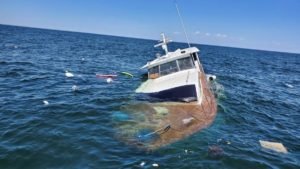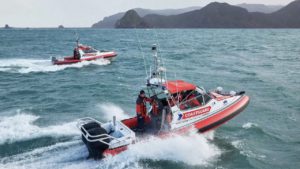
Maritime workers face dangers and risks unique to working on or near the sea. Accidents can be frequent, and injuries are often severe. A maritime workplace accident or injury can take place at any time, but the risk is even higher when there is onboard negligence. Injured maritime workers often experience stress and anxiety caused by such accidents and can be unsure of how to proceed with their claims.
Mounting medical bills from the injury can increase this stress. Especially if you’re the main breadwinner at home and have had to miss work to recover. A Chalmette maritime injury lawyer can provide legal counsel on maritime injury law and take the stress of a legal injury case off your shoulders so you can focus on healing and rest.
Causes of Maritime Injuries
Many different factors can cause maritime workplace accidents, including:
- Mechanical failure of equipment or a ship’s engine
- Violent acts of nature, like waves, winds, high seas, and storms
- Inappropriate use of safety equipment, such as life preservers or safety lines
- Human error due to excessive workload or working with no breaks
- Lack of training for the duties a maritime employee was hired to perform
- Improper use of toxic materials
Many accidents (and a lot of the examples above) can be traced back to employer or shipowner’s negligence. Your employer has a responsibility to provide you with a safe working environment. A maritime injury lawyer can help determine if negligence played a part in your injury and who may be liable.
Laborde Earles injury was great for me they took care of me very fast and professional. If for any reason I need legal help they will be who I use.
ClientHow a Chalmette Maritime Injury Lawyer Can Help
Maritime law focuses on activities and disputes related to the sea. This can include commercial maritime activities, such as shipping, transportation by water, fishing, seafood, and offshore energy production, such as oil rigs. Maritime law can also cover recreational boating activities and disputes.
If you’re a maritime worker and have been injured at work, a Chalmette maritime lawyer can help. Your lawyer could help gather evidence, complete all the paperwork, work with your doctor to determine the amount of care you’ll need and how much it could cost, and represent you in court if necessary.
I thank God for Digger & David. I don’t know what we would have done if it hadn’t have been for them.
Rick Smith | ClientUnderstanding the Jones Act
The Jones Act is a federal law passed in 1920 as an amendment to the Merchant Marine Act. The Jones Act aims to protect seamen and other maritime workers and provide them or their families a chance to pursue compensation for their damages, conditions, or losses if they’ve been in an accident at work.
Under the Jones Act, employees can also recover lost wages, medical expenses, and maintenance and cure benefits.
Who Is Covered Under the Jones Act?
The Jones Act applies specifically to “seamen.” This means anyone who works on a vessel in navigable waters that is used at least partly in the service of commerce or trade.
This can include people who work on:
- Tugboats
- Fishing boats
- Barges
- Oil rigs
- Cargo ships
- Drilling platforms
It doesn’t include people who work on recreational boats or non-commercial vessels, such as personal watercraft. It also excludes individuals who work on land-based operations, even if they involve a maritime component.
The reassurance from Digger and his staff gave me that renewed hope that it’s going to be okay down the road.
ClientUnderstanding the Longshore and Harbor Workers’ Compensation Act
The Longshore and Harbor Workers’ Compensation Act (LHWCA) is a federal law that provides the opportunity to seek compensation to employees who suffer injury or death in maritime employment. The LHWCA helps injured workers who aren’t covered under the Jones Act. This can include dock workers, shipbuilders, longshoremen, or even shipping terminal workers.
When a maritime worker suffers an injury that falls under the LHWCA, the worker can seek medical compensation for hospital stays, physical therapy, prescription medication, and more, until they can return to work. They can also pursue compensation for lost wages and lost future earnings if the injury has made them unable to work.
Do I Qualify Under the LHWCA?
Lawyers can determine LHWCA injury claim eligibility by asking three questions:
- Was there an injury requiring medical care?
- Was the injury sustained on navigable waters or adjoining areas?
- Was the worker engaged in maritime employment at the time of the accident?
If you have answered yes to all three questions, your injury claim may fall under the LHWCA. A Chalmette maritime lawyer can advise you on the next course of action and guide you safely through the entire legal process.
They treated us like no other people would. Whenever we needed something they were there for us. I put my trust in them and I don’t regret it.
ClientDeadlines to File Injury Claims
The deadline to file your maritime injury claim is called the statute of limitations. If you miss the deadline, you might lose your right to compensation. Under the Jones Act, an injured seaman must file a lawsuit within three years of their injury and should report the injury to their employer within seven days.
Under the LHWCA, a maritime worker has just two years from the date of the accident to file an injury claim and must report the accident to their employer within 30 days.
Contact Laborde Earles Injury Lawyers for Legal Help
Maritime accidents can be traumatic and injuries severe. Trying to take on your own legal case can be confusing at the best of times, but can often be overwhelming in the aftermath of a debilitating injury. If you’re a maritime worker who has been injured in a workplace accident, a Chalmette maritime injury lawyer from our firm can help. We can handle your claim while you recover. Call Laborde Earles Injury Lawyers today for more information and a free consultation.





